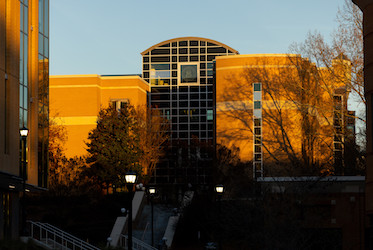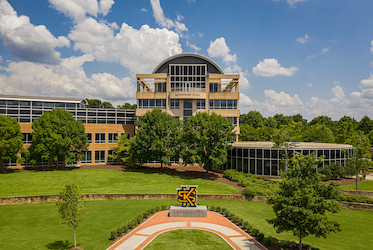
Kennesaw State students share with Board of Regents how campus services have helped them succeed
KENNESAW, Ga. | Jan 13, 2022
Undergraduate students from Kennesaw State University on Thursday shared with the Board of Regents of the University System of Georgia the opportunities and support two University programs have provided to assist in overcoming obstacles relating to substance abuse, food insecurity and homelessness.
The presentation was part of the Board of Regents Campus Spotlight, an initiative established in 2017 to highlight the faculty, students and academic programs of the 26 institutions in the University System of Georgia.
KSU’s students — senior psychology major Ziggy Kolker, freshman media and entertainment major Artis Jordan Obote and junior psychology and art major Frankie Berryman — shared how the Campus Awareness, Resource & Empowerment (CARE) Services and Center for Young Adult Addiction Recovery (CYAAR) programs have contributed to their success.

CARE Services provide students access to food, temporary housing and other support services for a healthy, stable and dignified life academically and professionally.
CYAAR supports and encourages young adult recovery and wellness by providing recovery-based programs and engaging in young adult addiction research and education.
Berryman, who volunteers with CYAAR as an ambassador and research assistant, said his experience with both CYAAR and CARE have been the greatest gifts of his own recovery.
A drug overdose in 2014 landed him in intensive care, followed by two months of treatment and rocky academic experiences.
In 2016, Berryman was accepted to KSU, but drug and alcohol abuse persisted, and he stopped attending class in 2017. Berryman said the next two years were a “tornado of consequences,” until a coworker’s acceptance to KSU and CYAAR also introduced Berryman to the program’s staff.
Berryman returned to KSU in January 2020, and with the help of CYAAR and CARE services, improved his GPA from 0.4 to 3.52. He recently finished another semester with a 4.0 GPA.
“All I had to do was get up every day and get myself to school, and as long as I did that, CYAAR and CARE staff and community helped me with the rest,” he said. “I’m a better friend, peer, student and person because of these programs.”
Kolker said CYAAR was the reason he chose to attend KSU and has been a key component to his success. A few years before he reentered college, drugs and alcohol had caused Kolker to lose friends, family, college aspirations and home, he said. The support from the students in CYAAR with shared experiences made him feel understood and supported, he said.
Kolker said CYAAR showed him a path forward in education, adding that scholarships from the program allowed him to remain debt-free.
“I now have the confidence to go into the world with my head held high, knowing that I can be a productive member of society in a field that I’m passionate about,” he said.
Obote said his journey from foster care and abuse in childhood to homelessness in young adult life made college seem impossible.
“Upon hearing about the CARE program, a weight was lifted off my shoulders, because I had a small chance of being able to go to college,” he said.
Obote said throughout his time at KSU, the program and staff provided the necessities that allowed him to go to school.
“Without the CARE program, I don’t know where I would be in life right now,” he said. “I couldn’t have been more blessed to be here at KSU.”
The students also highlighted to Board of Regents members that beyond housing, food and recovery support, the programs taught them skills that they could use to sustain their success.
“Both programs help our students succeed in the classroom and in life,” said KSU Interim President Kat Schwaig. “You will not find more authentic students, more courageous students, and we love to hear about their success.”
– Thomas Hartwell
Related Stories
A leader in innovative teaching and learning, Kennesaw State University offers undergraduate, graduate and doctoral degrees to its more than 45,000 students. Kennesaw State is a member of the University System of Georgia with 11 academic colleges. The university’s vibrant campus culture, diverse population, strong global ties and entrepreneurial spirit draw students from throughout the country and the world. Kennesaw State is a Carnegie-designated doctoral research institution (R2), placing it among an elite group of only 7 percent of U.S. colleges and universities with an R1 or R2 status. For more information, visit kennesaw.edu.


















